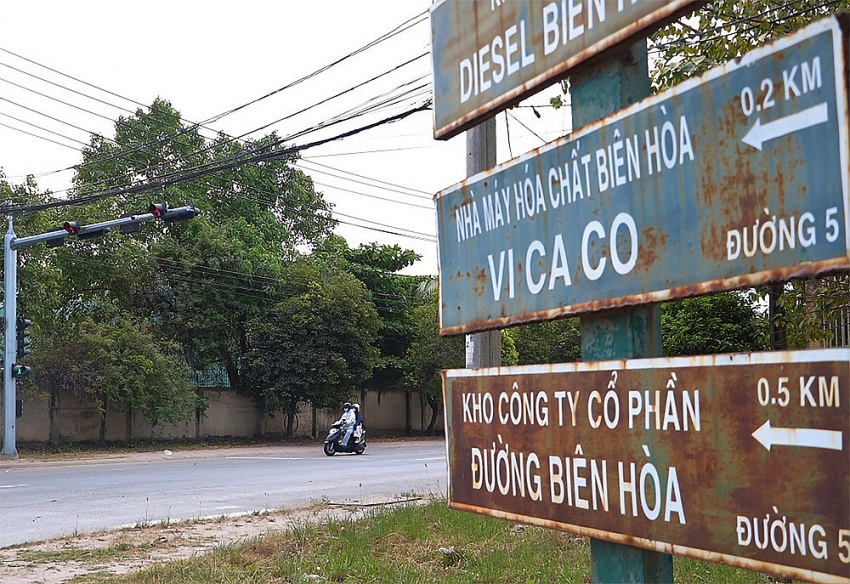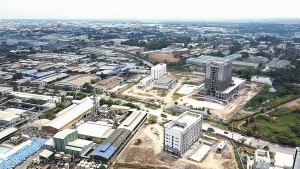Uncertain future for Bien Hoa IP’s workers and businesses
Huge moving costs, legal barriers, and other complicated procedures are likely to be the biggest hurdles during the mass relocation of over 70 businesses from Bien Hoa 1 Industrial Park (IP) to other parks in Dong Nai province, some 10 years after the relocation was initially approved.
 |
| Photo: Le Toan |
Authorities in the southern province last month approved a new plan to convert Bien Hoa 1 IP, the country’s oldest, into an urban, trade, and service area, local officials said. As a result, the province aims to relocate enterprises before the end of 2025.
The top reason for the undertaking is to protect the environment in the area, which encompasses the Dong Nai river, as well as to encourage green industrial areas away from more populated locations.
Some companies have already made the move, albeit it at a heavy cost. Everpia JSC, a bedding and padding manufacturer, initially leased land for 35 years through a deal that was set to expire in 2035. However, it decided to make the move last year instead of waiting for guidelines.
Company representative Le Thi Thu Van noted that the move to Giang Dien IP in the same province was finalised in May 2023.
“During the relocation process, we encountered many difficulties. Firstly, we had to disassemble the machinery system to move and many were degraded due to the move,” Van said. “Transport costs were very expensive, and we paid nearly $30,000 just to remove the gas tanks. This is not to mention additional costs to re-check the tanks before re-assembling.”
General relocation costs were heavy, Van added, while orders were reduced and led to some losses, but the arrangement of labour for new sites is possibly the greatest long-term headache.
While its factory stopped operation for moving, Everpia still had to pay wages and assistance fees for workers without any production.
“With the current 400 workers, total assistance reached hundreds of thousands of dollars. This is not to mention other additional costs, such as paying around $8,300 per month for transport expenses for workers from the old to the new site. We planned to hire local labour at the new site, but it is simply not available,” Van said.
Some companies are struggling to find an answer to building new factories from scratch elsewhere. According to Pham Hong Phu, general director of Southern Rubber Industry JSC (Casumina), the total land rental for building a new factory over a 10-hectare land plot could be over $16 million.
“The company will also have to bear an additional $25 million for the cost of installing machinery, equipment, and a firefighting system,” Phu said.
At the same time, Phu is worried because the company has two tyre factories located in Bien Hoa 1 that have been operating for more than 20 years, but finding new premises is not easy.
“We have been active in looking for a new site. However, we do not know anything about local provincial assistance, so we cannot build a proper plan,” Phu said.
He also does not know how to deal with the current 200 workers who have been with the company for years.
“They have been mostly living around the old site for years, and cannot afford to move to new destinations. If we cannot bring workers with us, the company must build a new management system, as well as recruit and retrain human resources, which costs a lot of time and money,” Phu said.
Dong Nai People’s Committee is in the process of setting up policies to support businesses and workers. It has approved a sum of around $312 million for supporting land clearance and compensation, and believes over $50 million will be needed to safeguard worker livelihoods and help stabilise operations. However, companies are still in the dark over how to actually access any of this assistance.
One massive hurdle to overcome with any relocation is maintaining commitments as signed in various contracts, especially with foreign businesses.
Explaining the slow process of issuing support, at a dialogue between companies and leaders of Dong Nai People’s Committee in March, Tran Vu Hoai Ha, deputy director of the Dong Nai Department of Planning and Investment, said that related departments and agencies are developing support mechanisms, but the problem is that they must serve both domestic enterprises and foreign-invested companies.
Currently, some foreign-invested enterprises have investment protection commitments, so negotiations need to be conducted to avoid conflict with signed commitments.
“Relocation of an IP is an unprecedented issue in Vietnam. Its accompanying support policies are being set up for the first time, and we have to collect opinions and discuss with different authorities to ensure that the interests of all sides are met,” Ha said.
Nobuyuki Matsumoto, chief representative of the Japan External Trade Organization in Ho Chi Minh City, said that the relocation of Bien Hoa 1 will have a great impact on businesses. “I hope the relocation issue will be resolved amicably after thorough discussion between relevant parties,” he said.
| Nguyen Van Phuc, lawyer HM&P Law The first thing that investors require is a stable business environment, and manufacturing factories must be guaranteed for long-term operation. The fact that businesses had to relocate when in operation in Bien Hoa 1 has caused huge difficulties and costs for investors. The government needs to have appropriate policies with a longer-term vision in planning IPs and economic zones. The development of such parks will inevitably lead to the development of neighbouring urban areas. This is understandable because the need to live near the workplace is legitimate. Therefore, to avoid the same situation as in Bien Hoa 1, future IPs need to be implemented with a longer-term vision and located in suitable locations to avoid any interruption. They must be consistent with the planning of transport infrastructure and neighbouring urban areas to ensure the ability of workers to easily move to work. The relocation of Bien Hoa 1 should be considered as a case study that competent authorities have to learn from when developing the law on IPs and economic zones, as well as other related legal documents. Le Ngoc Anh Minh, general director Pacific Group The policy of relocating Bien Hoa 1 is wholly correct because of the consequences related to the environment. This IP should have been relocated sooner because it is now not possible to have an IP in a city centre. Part of Bien Hoa 1 should be converted into a high-tech park, attracting businesses to set up research and development centres, instead of converting it all into an urban area. From the consequences of having to relocate Bien Hoa 1, it is necessary to draw lessons in planning IPs in the future, which must be calculated and realistically aligned with the urban development process. In particular, the construction of new IPs needs to pay attention to synchronous investment in infrastructure, especially wastewater treatment, to protect the environment. At the same time, surrounding residential areas must be properly planned to ensure accommodation and services for workers. Currently, the model of developing IPs next to urban areas with synchronous infrastructure that developed countries are implementing is a model that we should refer to. |
 | Support framework will help mass relocation efforts After more than 60 years of operation, the government has approved the relocation of Bien Hoa 1 Industrial Park to a new site. Meir Tlebalde, CEO and Nguyen Vu Anh, head of Industrial and Business Development at Sunwah Kirin Vietnam, share their recommendations to support enterprises while moving to the new site. |
What the stars mean:
★ Poor ★ ★ Promising ★★★ Good ★★★★ Very good ★★★★★ Exceptional
Related Contents
Latest News
More News
- An Phat 5 Industrial Park targets ESG-driven investors in Hai Phong (January 26, 2026 | 08:30)
- Decree opens incentives for green urban development (January 24, 2026 | 11:18)
- Public investment is reshaping real estate’s role in Vietnam (January 21, 2026 | 10:04)
- Ho Chi Minh City seeks investor to revive Binh Quoi–Thanh Da project (January 19, 2026 | 11:58)
- Sun Group launches construction of Rach Chiec sports complex (January 16, 2026 | 16:17)
- CEO Group breaks ground on first industrial park in Haiphong Free Trade Zone (January 15, 2026 | 15:47)
- BRIGHTPARK Entertainment Complex opens in Ninh Binh (January 12, 2026 | 14:27)
- Ho Chi Minh City's industrial parks top $5.3 billion investment in 2025 (January 06, 2026 | 08:38)
- Why Vietnam must build a global strategy for its construction industry (December 31, 2025 | 18:57)
- Housing operations must be effective (December 29, 2025 | 10:00)

 Tag:
Tag:




















 Mobile Version
Mobile Version